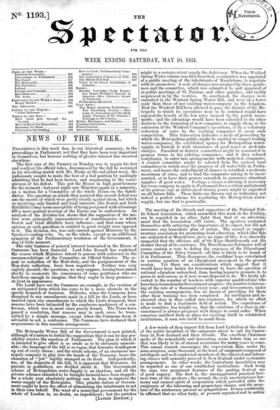might to a certain extent supply the deficiency. When the
Watford Spring Water scheme was first broached, a committee was appointed at a public meeting of the inhabitants of Marylebone, to negotiate with its promoters. A scale of charges was arranged by those gentle- men and the committee, which was submitted to and approved of at public meetings of St. Pancras and other parishes, and tacitly acquiesced in by the vestries. So sanctioned, the charges were embodied in the Watford Spring Water Bill, and were on a lower scale than those of any existing water-company in the kingdom. Had the Watford Bill been allowed to pass, the district of the Me- tropolis to which its operations were to be confined would have enjoyed the benefit of the low rates insured by the parish 'move- ments ; 'and the advantage would have been extended to the other districts by the formation of new companies to supply them, or the extension of the Watford Company's operations, or by a voluntary reduction of rates by the existing companies to avert such' competition. This transaction indicates a mode of proceeding by which the Metropolitan public might be enabled to compel trading water-companies, the established agency for Metropolitan water-- supply, to furnish it with abundance of good water at moderate charges. Parochial or district committees might be nominated to propose terms to the existing companies ; and if they refused compliance, to enter into arrangements with projected companies.' A central committee might be selected from the various local committees to watch over the progress of all water-bills in Parlia ment, and insure the embodiment of clauses to establish a moderate. maximum of rates, and to bind the companies asking to be incor- porated,- or to have their powers extended, -to guarantee alitmdant supplies of good water.. Perhaps a elause,rendering it necesssaarryy for every company to apply to Parliament for a revision andreriewal of its powers (say at intervals of twenty years) might be engrafted. on all future bills. These hints are thrown out as indicating not indeed a perfect scheme for regulating the Metropolitan water- supply, but one that is practicable.


























